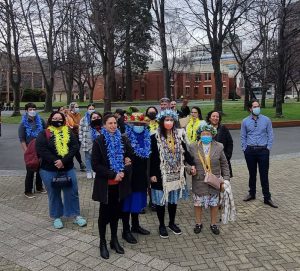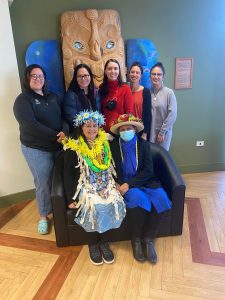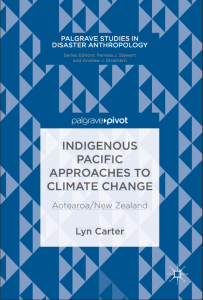Te Tumu welcomes new lecturer

The manuhiri await the karanga. Dr Jess Pasisi stands in the centre of the front row, and Maioha Watson on the far right.
Fakaalofa ahi atu!
On Wednesday 7 September, Te Tumu welcomed our newest staff member, Dr Jess Pasisi, who is of Niuean descent, as well as Pākehā, Ngāti Pikiao and Tahitian roots.
This was also an opportunity to welcome and acknowledge Maioha Watson (Ngāti Maniapoto) who has been doing an excellent job teaching MAOR308 this semester.
The pōwhiri followed tikanga Māori, but also incorporated Pacific elements as well, with Niuean speeches and a performance by our Pacific coordinator Telesia Kalavite alongside Tongan students, as well as Pacific food for the hākari. Special thanks must also go to Maioha, the kaikōrero for the manuhiri, Neihana Matiu who spoke for the tangata whenua, and Kare Tipa who had held waiata classes for staff, and who kept us to tikanga.

Rear, from left: Waikato staff and postgrads: Marcelle Wharerau, Marama Salsano, Karamea Moana Wright, Hineitimoana Greensill, and Jesi Lujan Bennett. Front: Jess Pasisi and Luisa Posimani.
Jess is currently finishing off a Health Research Council funded postdoctoral studies on Niuean wellbeing and happiness that she started while at the University of Waikato. She also has research interests in climate change in the Pacific, and the Pacific countries that make up the New Zealand realm (Cook Islands, Niue and Tokelau).
Some Waikato postgraduate students and staff came with Jess to hand her over to Te Tumu. Dunedin-based people may well remember Marcelle Wharerau, who worked and studied in Te Tumu, gaining an MA in Indigenous Development. After the pōwhiri, these guests attended a ‘conversation’ organised by Dr Emma Powell, together with a number of Te Tumu staff. Everyone had some time to share their research and discuss some of their experiences within academia.
Te Tumu is very pleased to have Jess joining our Pacific Islands Studies team, and look forward to what she can bring us. Fakaaue lahi!
10 questions with . . . Jenny Bryant-Tolalau
Last week we featured Lyn Carter’s new book on Indigenous Pacific responses to Climate Change and her 10-question interview with the Association of Social Anthropologists of Aotearoa/New Zealand. Jenny Bryant-Tokalau has researched collaboratively with Lyn, and until her recent retirement, was a member of Te Tumu’s Pacific Islands Studies programme. Jenny has published Indigenous Pacific Approaches to Climate Change, as a companion volume to Lyn’s as part of the Palgrave Studies in Disaster Anthropology series. Click here to download Jenny’s book. ASAA/NZ also asked Jenny the 10 questions. Click here to see.
10 questions with . . . Lyn Carter.
The Association of Social Anthropologists of Aotearoa/New Zealand recently conducted a ’10 questions with’ session with Te Tumu’s Lyn Carter about her newly released book Indigenous Pacific Approaches to Climate Change: Aotearoa/New Zealand on their blogsite. Click here to read all about it.
New book: Indigenous Pacific Approaches to Climate Change
 Climate Change is an issue for the Pacific. We are delighted to announce the lastest book by a Te Tumu scholar, Dr Lyn Carter, Indigenous Pacific Approaches to Climate Change, published as part of Palgrave’s Studies in Disaster Anthropology Series.
Climate Change is an issue for the Pacific. We are delighted to announce the lastest book by a Te Tumu scholar, Dr Lyn Carter, Indigenous Pacific Approaches to Climate Change, published as part of Palgrave’s Studies in Disaster Anthropology Series.
Dr Carter, a Ngāi Tahu scholar, is a member of Te Tumu’s Indigenous Development programme, and teaches the popular INDV301 course, Māori and Indigenous Development Ethics and Government.
From the publisher: “Situating Māori Ecological Knowledge (MEK) within traditional environmental knowledge (TEK) frameworks, this book recognizes that indigenous ecological knowledge contributes to our understanding of how we live in our world (our world views), and in turn, how we adapt to climate change.
“As an industrialized nation, Aotearoa/New Zealand (A/NZ) has responsibilities and obligations to other Pacific dwellers, including its indigenous populations. In this context, Lyn Carter discusses how A/NZ can benefit from the wider Pacific strategies already in place; how to meet its global obligations to reducing greenhouse gases; and how A/NZ can utilize MEK to achieve substantial inroads into long-term adaptation strategies and sustainable practices. Carter demonstrates that in all respects Māori tribal groups are well-placed to be key players: adaptation strategies, policies, and practices are integrated throughout Māori/Iwi traditional knowledge.”
Click here to access this new book.


